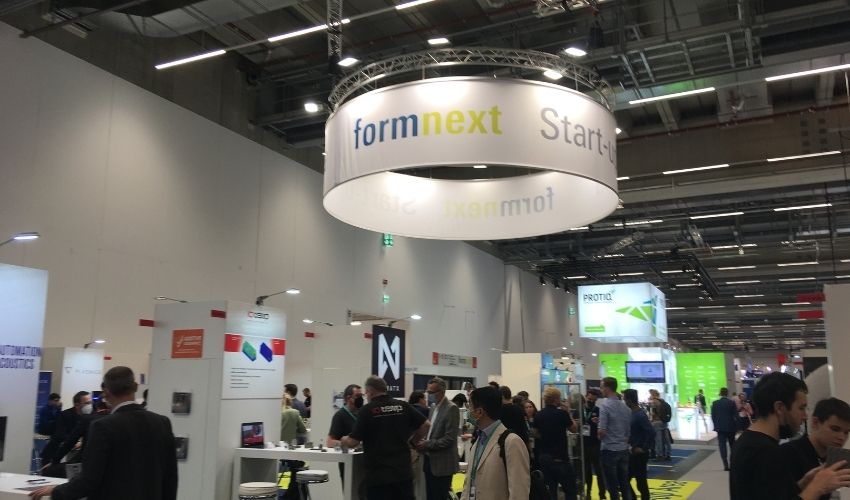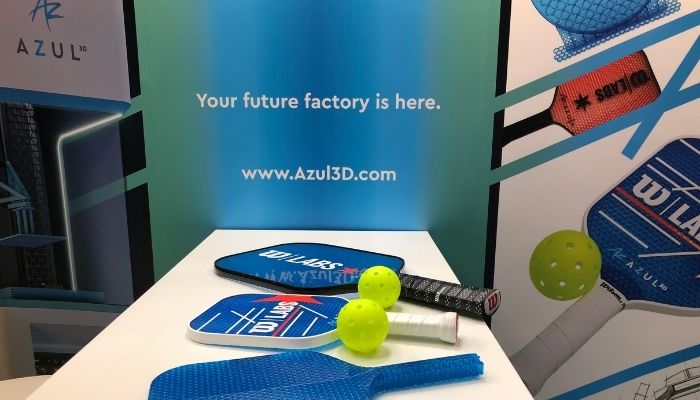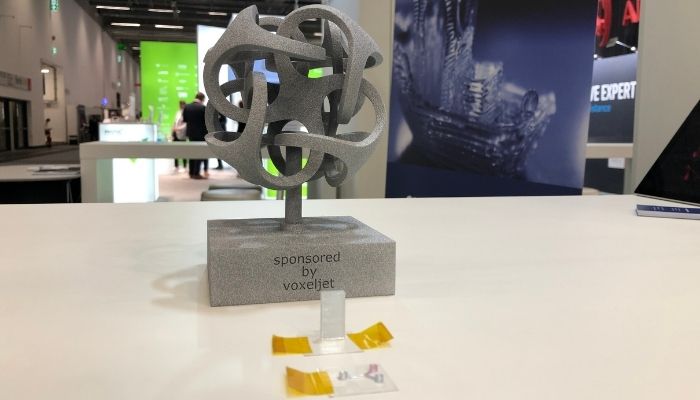Who Were the Winners of the Formnext Start-Up Challenge 2021?

Formnext 2021 started this week and has been an incredible opportunity for many of the leading actors in additive manufacturing to get together after two years to connect and share ideas. One aspect of the trade show that particularly excited us was the award ceremony for the Formnext Start-Up Challenge 2021 which recognized five up and coming, innovative start-ups in AM on November 16th. Atlant 3D Nanosystems, Azul 3D, Fited, Print Parts and Nobula, as well as the winner of the AM Ventures Impact Award, Vispala Technologies, impressed the judges with their innovative technologies and applications.
This is the seventh time that the start-up challenge is taking place at Formnext. It recognizes companies that are no more than five years old and is designed as well to help support startups, not just through recognition but also by providing free participation in the trade show and a comprehensive marketing package. Winners are chosen from a panel of judges from industry, science, media, and investment and are able to participate in a pitch event on the 16th, helping them to make important contacts within the industry. One startup is also recognized each year for the AM Ventures Impact Award which is given to an applicant concerned with sustainability, including environmental considerations and social aspects.

The award ceremony for the Start-Up Challenge took place at Formnext on Tuesday, November 16th (photo credits: 3Dnatives)
Who are the winning startups 2021?
The winners of the start-up challenge this year come from a wide variety of sectors and countries. They are Atlant 3D Nanosystems (Denmark), Azul 3D (USA), Fited (USA), Print Parts (USA) and Nobula (Sweden). This year, Formnext recognized especially that both the quality of the startups and their innovations seemed to have developed even further than in previous years. This is because many of them boasted numerous patents already and had earned a number of investments for their applications, showing both promise and market-readiness. Formnext also noted the importance of their contributions to 3D printing as a whole, noting especially the possibility of greater precision, faster productions and new applications in sectors like aerospace and medicine. Let’s take a closer look at the five winners from the Formnext Start-Up Challenge 2021.
Atlant 3D Nanosystems
Atlant 3D Nanosytems, from Denmark, specializes in creating micro- and nano-components using multiple materials and atomic precision. Their advanced manufacturing systems can be used for a variety of applications including in R&D, prototyping and manufacturing. These systems can process up to 6 materials on substrates at one time, even those with differing properties. Their Nanofabricator LiteTM was developed after NASA approached the company to solve a particular problem for them. Ivan Kundrata, one of the cofounders, told us, “NASA had a custom problem, they needed a solution for an experiment. They already had a flight scheduled to take their experiment for 3 minutes in micro-gravity. But in their machine, they had created, they could not prove that atomic layer deposition works in micro-gravity because 3 minutes was not enough time. We actually managed to create a solution with our spatial approach which is faster and we saw that in 3 minutes they would have even more data than they needed.” Thanks to this, NASA will be able to use the machine to test microfabrication in micro- or zero gravity.
Azul 3D
Meanwhile, Azul 3D, a Northwestern spin-off, was chosen for its newly developed HARP technology. The technology uses flowing oil between light-driven resin and a UV source. Azul 3D hopes it will enable users to take advantage of the benefits of resin printing, such as fine details and excellent surfaces, while addressing some of its drawbacks, thanks to a faster printer time and a large print volume. The technology can be used in many different sectors, Tuan Tranpham, Chief Revenue Officer at the company, noted, “Azul 3D’s ambition is to drive polymer DLP into mass-production and we are targeting sectors with high volume. This could be for example sporting goods and consumer goods, but also industrial applications and automotive.”

Azul’s new technology can be used in a variety of different industries including sports (photo credits: 3Dnatives)
Fited
In the medical sector, American start-up Fited has used 3D printing to create a new solution to treat spinal deformities. Based off of the same principles applied to dental braces, the company has create a so-called Invisalign for the spine. They hope to replace hand-made, expensive, time-consuming scoliosis braces with a 3D printed version that is both faster to make and more accurate for the patient. The company predicts that their Fited braces, which are breathable, custom-made and light, will prevent the need for surgery in 72% of cases, for a variety of reasons including, according to Wout Verswijveren, an industrial design engineer at the company, because “Wearing a scoliosis brace, for young children is very difficult as well from a social perspective. The most important thing we can address is that it’s more comfortable, it’s less ugly, it’s less cumbersome and that means that compliance rates among patients is much higher. And this is critical for ensuring that the treatment is a success.”
Print Parts
US start-up Print Parts is also using nanotechnology. However, contrary to Atlant 3D, Print Parts has developed a digital signature that can be embedded in parts using additive manufacturing. This results in components that are scannable, serialized and cloud-connected. These programmable nanoparticles can be either embedded within additive materials or added later to the parts. The company notes that their platform combines management, authentication and tracing of 3D printed parts.
Nobula
Last but certainly not least, Swedish Nobula has created a desktop glass 3D printer, with lasers reaching 2000°C, which they hope will be both cheaper and more versatile than existing glass solutions, with the possibility of using materials like silica glass which has superior properties. Though glass 3D printing is not exactly common, it does already exist, usually using SLS or FFF. For Nobula, their technology is called Direct Glass Laser Deposition (DGLD) and does not require annealing afterwards, a significant advantage. They hold that it allows users to 3D print glass as easily as plastic. This could be especially useful for research applications, Taras Oriekhov, the CTO and co-founder, commented “We talk to many industries. For example, the biomedical industry and applications like mirofluidics, micro lens, optics and more.”

The award for the Formnext Start-Up Challenge 2021 was 3D printed. Seen here with some glass applications from Nobula (photo credits: 3Dnatives)
AM Ventures Impact Award 2021
This is also the second year that the AM Ventures Impact Award has been presented. The award continues to be popular among participating start-ups, shown by the fact that two-thirds of applicants to the Start-Up Challenge also entered the Impact Award. This is perhaps unsurprising as this award awards sustainable approaches that have a positive impact on environmental protection or social welfare, two things that are often at the forefront of many additive manufacturing initiatives, thanks to the technologies’ flexibility and ability to reduce waste.
This year, the winner was Vispala Technologies from India who are using 3D printing to create affordable, highly functional, aesthetically appealing prosthetics. They were chosen because the company concentrates on people living in developing countries and rural areas, those who often do not have access to these types of products due to lack of access or just expense. On their website, the company especially highlights the importance of improving quality of life in communities thanks to access to healthcare innovations. They are one of many companies discovering the usefulness of 3D printing when it comes to the medical sector. You can learn more about all the start-ups in Formnext’s press release HERE.
What do you think of the winners of this year’s Formnext Start-Up Challenge 2021 and the AM Ventures Impact Award? Let us know in a comment below or on our Linkedin, Facebook, and Twitter pages! Don’t forget to sign up for our free weekly Newsletter here, the latest 3D printing news straight to your inbox! You can also find all our videos on our YouTube channel.
*Cover Photo Credits: 3Dnatives






